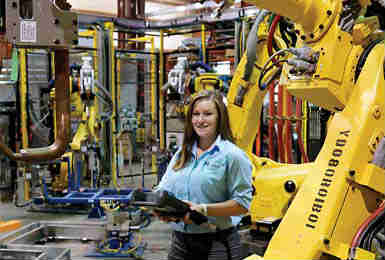Department of Labor Grants To Help Fill the Skilled Labor Gap
It’s a $2 billion bet on the part of the U.S. Department of Labor — that an injection of funds into hundreds of community colleges around the country will fill the skills gap for qualified employees capable of taking technical jobs in manufacturing, information technology, healthcare, and other professions.
November 2012

Just seven miles from his plant, however, is Fox Valley Technical College (FVTC) in Appleton. Through the second installment of the $2 billion, four-year initiative, FVTC received $3 million to develop the Advanced Manufacturing Pathways PLUS project, a program that focuses on developing skills in electronics/automation, welding and metal fabrication, printing and publishing, and machine tooling. Part of the federal grant dollars are going toward changing that cultural perception says Chris Jossart, spokesperson for Fox Valley Tech. On National Manufacturing Day, the technical college that serves about 53,000 students each year, organized a bus tour of its Oshkosh facility and three area manufacturers. “Immediately,” says Jossart, “when these students come into our Advanced Manufacturing Center, they’re looking at digital, high-tech welding resources that totally change their perception of welding and fabrication as a career.”
Twenty-three-year-old Valarie Wocjik is one of Fox Valley Tech’s success stories. She graduated from the welding program in 2009, transferred to Ferris State University in Michigan through an articulation agreement, and obtained a bachelor’s degree in welding engineering technology. Wocjik is now a project engineer at Hirotec America in Auburn Hills, Michigan, an assembly line fabricator for the automotive industry. “She goes into these manufacturing settings,” says Jossart, “and blows people’s minds when they find out she can weld.”
The Trade Adjustment Assistance Community College and Career Training grants are awarded to partnerships between colleges and employers to promote skills development in fields like advanced manufacturing, healthcare, and transportation. They are targeted, at least in part, at workers who have been displaced by trade policies and outsourcing. The programming developed by the colleges will not remain those schools’ exclusive property. To accept the funding, the partners agree to make all educational materials they develop available for use by the public and other education providers through a “Creative Commons” license.
Every state in the nation has received some level of funding, but more is available with two more rounds to go. Applications for the next round will be reviewed in the spring of 2013. A complete listing of grants awarded to date is available at www.doleta.gov/taaccct.
Project Announcements
ContiTech Expands Mount Pleasant, Iowa, Production Operations
12/07/2025
Modular Closets Plans Kernersville, North Carolina, Production Operations
12/07/2025
QMP Plans Walterboro, South Carolina, Operations
12/06/2025
Ninth Avenue Foods Plans Longview, Texas, Production Operations
12/06/2025
LayerZero Power Systems Expands Streetsboro, Ohio, Manufacturing Operations
12/06/2025
BioStem Technologies Plans Boca Raton, Florida, Headquarters Operations
12/06/2025
Most Read
-
Rethinking Local Governments Through Consolidation and Choice
Q3 2025
-
First Person: Filter King’s Expansion Playbook
Q3 2025
-
Rethinking Auto Site Strategy in the Age of Tariffs and Powertrain Shifts
Q3 2025
-
Lead with Facts, Land the Deal
Q3 2025
-
How Canada Stays Competitive
Q3 2025
-
America’s Aerospace Reboot
Q3 2025
-
The Permit Puzzle and the Path to Groundbreaking
Q3 2025


